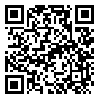Volume 2, Issue 4 (2014)
Health Educ Health Promot 2014, 2(4): 31-43 |
Back to browse issues page
Download citation:
BibTeX | RIS | EndNote | Medlars | ProCite | Reference Manager | RefWorks
Send citation to:



BibTeX | RIS | EndNote | Medlars | ProCite | Reference Manager | RefWorks
Send citation to:
khodayarian M, Lamyian M, Rahimdel M, Jalalpour S, Mirjalili S M. Knowledge and Beliefs about Breast Cancer Screening among Nurses and Midwives: A Cross-sectional Study. Health Educ Health Promot 2014; 2 (4) :31-43
URL: http://hehp.modares.ac.ir/article-5-3054-en.html
URL: http://hehp.modares.ac.ir/article-5-3054-en.html
Mahsa Khodayarian1, Minoor Lamyian *2, Mahin Rahimdel3, Sedigheh Jalalpour4, Seyed Mohsen Mirjalili4
1- Ph.D Candidate, Department of Health Education & Health Promotion, Nursing & Midwifery College, Shahid Sadoughi University of Medical Sciences and Health Services, Yazd, Iran
2- Associate Professor, Department of Midwifery and Reproductive Health, Tarbiat Modares University, Tehran, Iran
3- Midwifery Instructor, Shahid Sadoughi University of Medical Sciences and Health Services, Yazd, Iran
4- Bachelor of Nursing, Shahid Sadoughi University of Medical Sciences and Health Services, Yazd, Iran
2- Associate Professor, Department of Midwifery and Reproductive Health, Tarbiat Modares University, Tehran, Iran
3- Midwifery Instructor, Shahid Sadoughi University of Medical Sciences and Health Services, Yazd, Iran
4- Bachelor of Nursing, Shahid Sadoughi University of Medical Sciences and Health Services, Yazd, Iran
Abstract: (6676 Views)
Aim: Breast cancer is the most common type of cancer in Iranian women. Clinical nurses and midwives are supposed to be at high risk of the disease. The present study aimed at comparing the knowledge and health beliefs of Iranian nurses and midwives about breast cancer screening using Health Belief Model (HBM).
Methods: In this cross-sectional study, 100 nurses and 60 midwives working in teaching hospitals affiliated to Shahid Sadoughi University of Medical Sciences (Yazd, Iran) were selected via convenience sampling. Three questionnaires were used to collect data including a demographic questionnaire, the Breast Cancer Knowledge Test, and Champion’s Revised Health Belief Model Scale. Data were analyzed using SPSS-11.0 for Windows.
Findings: According to the independent t-test results, the mean knowledge scores of the two groups were significantly different (p<0.05). There was no significant difference in mean health belief scores between the two groups (p>0.05). Spearman’s rank correlation coefficient revealed a significant direct correlation between knowledge and health beliefs in both nurses and midwives (P=0.018; r=0.18). The same test suggested knowledge to have significant direct correlation with benefits of mammography (P=0.01; r=0.2), benefits of breast self-awareness (P<0.001; r=0.4), cues to action (P=0.001; r=0.2), and self-efficacy (P<0.001; r=0.3).
Conclusion: There are some risk factors including unhealthy life-style behaviours, exposure to night light, and consequently, disruption in circadian rhythm, and that job stress can threaten the health of nurses and midwives. Thus, it is important to determine their perceived barriers of screening behaviours based on HBM.
Article Type: Original Article |
Subject:
Health Promotion
Received: 2015/10/17 | Accepted: 2014/12/1 | Published: 2017/02/1
Received: 2015/10/17 | Accepted: 2014/12/1 | Published: 2017/02/1
| Rights and permissions | |
 |
This work is licensed under a Creative Commons Attribution-NonCommercial 4.0 International License. |





